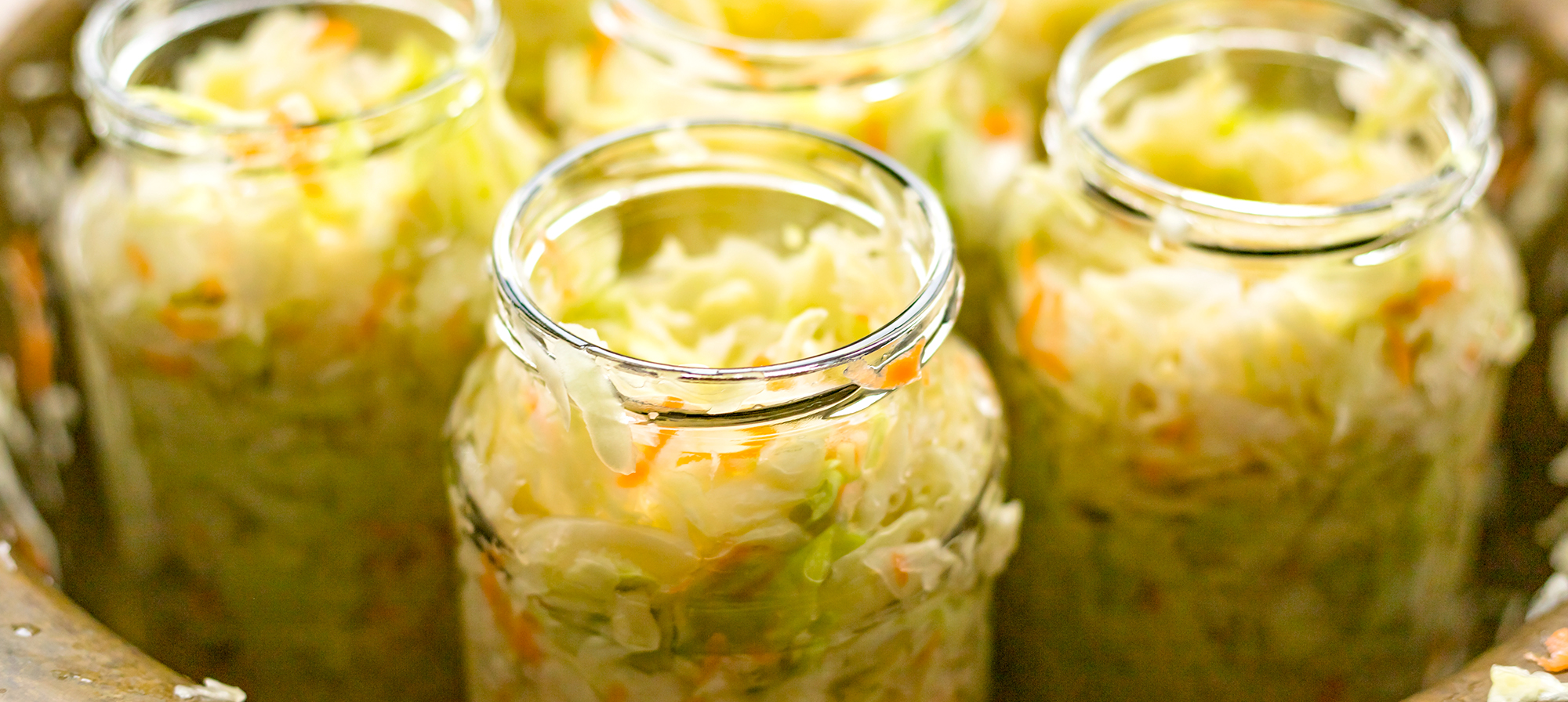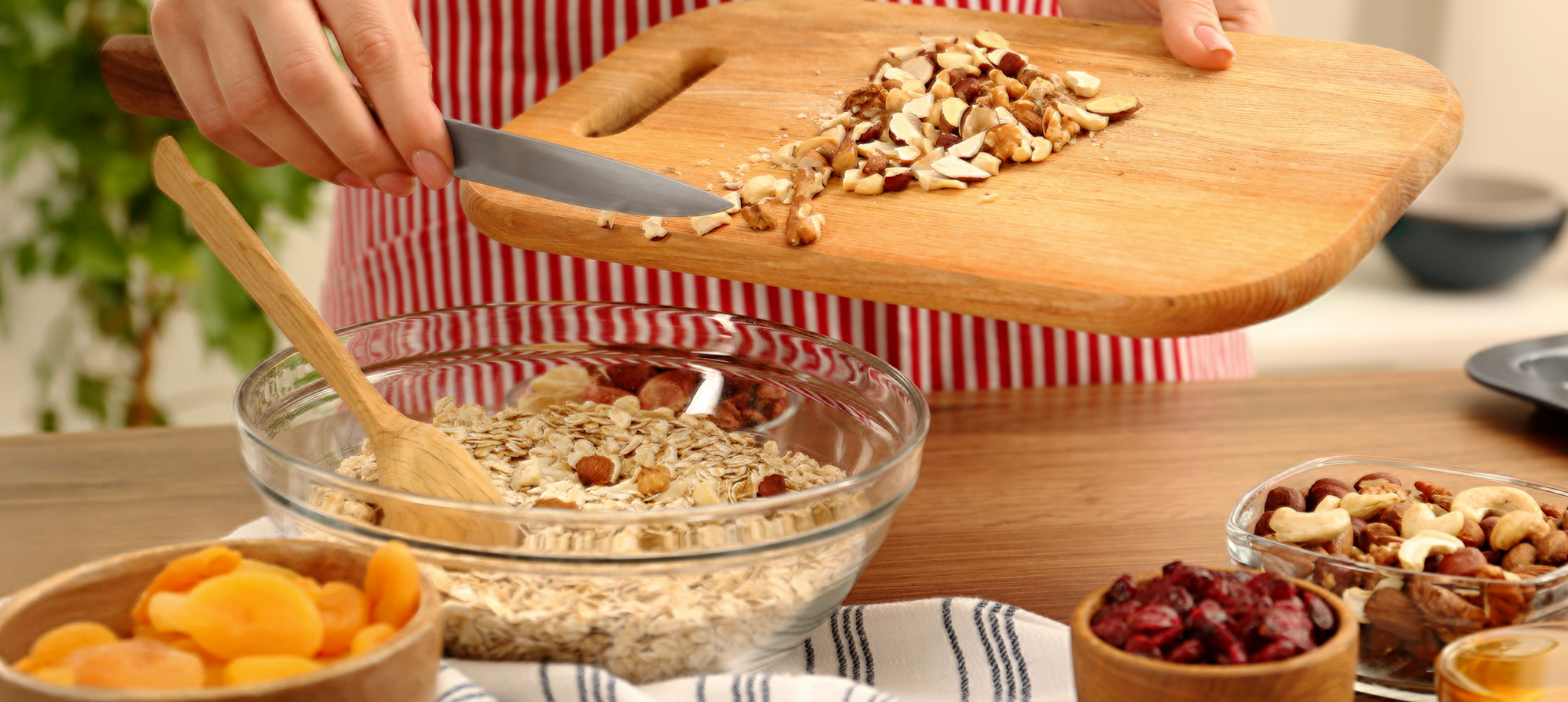Fermented foods—like yogurt, sauerkraut, kimchi, and others—have been around for centuries. The original reason for fermentation was to preserve food. But it turns out that the fermentation process also gives rise to bacteria that can support a healthy gut.
You probably don’t spend much time thinking about your gut. Oh sure, maybe in the symbolic sense. You “trust your gut” on big decisions. You “don’t have the guts” to do something that frightens you. You “spill your guts” to your friend. But in the literal sense, you likely aren’t pondering the inner workings of your gut, although you may want to. That’s because gut health plays a crucial role in your overall health.
What is gut health and why is it important?
Your gut contains trillions of microorganisms—mostly bacteria, but also fungi, and even viruses. These organisms live in your intestinal tract and form what is known as your gut microbiome .
Though tiny, these organisms play a big role in your overall health. They aid in digestion, nutrient absorption, the regulation of your immune system, and more.
Your microbiome has both good and bad bacteria. The good news is that the good usually outnumber the bad. The key is to help it stay that way.
When you tilt the scales in favor of healthy bacteria, the bad bugs have a harder time getting the nutrients they need to survive. But if the healthy bugs drop to less than optimal numbers, the bad bugs may thrive. When that happens, your health may take a hit.
An unhealthy balance in the gut is linked to a range of health problems. Researchers are still exploring the connection. But studies suggest that such an imbalance may play a role in:
- Digestive problems (such as diarrhea or constipation)
- Food sensitivities (such as gluten intolerance)
- Nasal allergies
- Urinary infections
- Fungal infections
You cannot overstate the importance of a healthy microbiome.

How fermented foods help good bacteria thrive
People have been fermenting food and drinks for centuries. The primary purpose was to preserve foods. But experts now know that the fermentation process imbues food and drinks with beneficial probiotics. Probiotics are considered “friendly” bacteria. They help spur the growth of healthy bacteria in your gut.
Studies show that fermented food and drinks can help the healthy bacteria in your gut thrive. They can also help increase the diversity of microbes in your gut. This, in turn, may help reduce harmful inflammation in your body. Having this greater mix of healthy bacteria has even been linked to a lower risk for some chronic health conditions.

Examples of common fermented foods
Foods like yogurt, kimchi, kombucha, and sauerkraut are some of the more common fermented foods available. You can find these at most supermarkets:
- Yogurt. Made from fermented milk, yogurt is one of the best sources of probiotics. Not all yogurts have live probiotics, though. Be sure to check the label for “active cultures” or “live cultures.” Some non-dairy or plant-based yogurts are also fermented and contain live cultures. But not all do, so check the label to make sure. Also, some yogurts are high in added sugars, so you may want to avoid those.
- Kefir. This fermented milk drink is full of calcium and probiotics. You can add this to smoothies or simply drink it on its own.
- Sauerkraut. This “sour cabbage” is made with nothing but cabbage and kosher salt. You’ll find sauerkraut in just about any supermarket. The refrigerated types tend to have higher levels of probiotics. (Want to try making your own? Here’s a simple recipe with only 3 ingredients.)
- Tempeh. Made from fermented soybeans, tempeh is similar to tofu. A big difference is that tofu is not fermented, so you won’t find any live probiotics there. Besides being a good source of probiotics, tempeh is also high in protein.
- Kimchi. This popular Korean side dish is made with cabbage and other vegetables. You can use it as a topping on foods or eat it as a side. Word of warning: Some kimchi can be spicy, so check the package first!
- Miso. This fermented paste is typically made from barley, rice, or soybeans. It adds a nice savory flavor to soups, salad dressings, and marinades.
- Kombucha. This tangy, bubbly drink is loaded with good bacteria. It’s often flavored with herbs or berries. Just try to steer clear of kombucha with high amounts of added sugar.

Look for naturally fermented foods
Not all fermented foods contain probiotics. If you’re buying them at the store, look for labels that clearly say, “naturally fermented.”
Most pickled foods, for instance, are not fermented. Pickled foods are preserved in an acidic liquid—such as vinegar—rather than going through a natural fermentation process. It’s easy to confuse “pickled” foods with “fermented” foods.
When you preserve a food with vinegar, it significantly slows down or even stops the growth of bacteria. So, if you’re looking to get the benefits of fermented foods, foods soaked in vinegar won’t be of much use.
Most fermented foods do have an acidic flavor, but that’s simply a byproduct of the fermentation process. Acids like vinegar are not added to fermented foods.
Again, check the label if you’re looking for a fermented product.

Other ways to help improve your gut health
Eating fermented foods is one of the best ways you can help maintain good gut health. But there are a few other strategies you can use to make sure the good bacteria in your gut thrive. You can:
- Load up on fresh fruits and vegetables. The high fiber content and natural sugars in fruits and veggies favor the growth of good bacteria.
- Limit added sugars, animal fat, and processed foods. These foods may create an environment that helps the bad bugs thrive.
- Only take antibiotics if prescribed by your doctor. You may need these bacteria-killing medicines from time to time. They can help cure many illnesses. But the problem is that they can’t tell good bugs from bad. These drugs destroy both. And that can wreak havoc on your microbiome. So, only take antibiotics if your doctor prescribes them. And take them exactly as prescribed.
- Limit your use of anti-inflammatory drugs. These include ibuprofen and aspirin. They can harm the lining of the small intestine. That can make it harder for healthy bacteria to do their job.
- Look into probiotic supplements. These over-the-counter supplements can help restore or maintain your gut health. There is no daily recommended intake for probiotics, so it’s best to follow the instructions on the bottle.
If you often have digestive problems, you may want to see your doctor. They can help pinpoint the cause. If there’s a bacterial imbalance, your doctor may suggest foods or supplements to help get the bacteria in your gut back in balance.
While there’s still much to learn about the link between fermented foods and gut health, the research thus far has been promising. Studies are still underway to learn more about this connection and how it affects your overall health.
In the meantime, pick a few fermented foods or drinks to try if you haven’t already. If there are a few you enjoy, add them to your food plan. They just may help improve the health of your gut and the rest of your body in the bargain.
And remember—no guts, no glory!
Not a Silver&Fit® member? Learn more about everything the program has to offer, including more helpful healthy living tips like this, here on our website.
This information is not intended to take the place of regular medical care or advice. Please check with your doctor before using this information or beginning any self-care program. Images used for this article do not depict any members of the Silver&Fit Program.
References
Barry, D. J., Wu, S. S. X., & Cooke, M. B. (2025). The relationship between gut microbiota, muscle mass and physical function in older individuals: A systematic review. Nutrients, 17(1), 81. https://doi.org/10.3390/nu17010081
Center for Disease Control and Prevention. (2024, May 10). Antibiotic Use and Antimicrobial Resistance Facts. Antibiotic Prescribing and Use. https://www.cdc.gov/antibiotic-use/data-research/facts-stats/index.html
Christensen, E. (2020, January 29). How to make homemade sauerkraut in a mason jar. Kitchn. https://www.thekitchn.com/how-to-make-homemade-sauerkraut-in-a-mason-jar-193124
Dimidi, E., Cox, S. R., Rossi, M., & Whelan, K. (2019, August 5). Fermented foods: Definitions and characteristics, impact on the gut microbiota and effects on gastrointestinal health and disease. Nutrients, 11(8). https://doi.org/10.3390/nu11081806
Guandalini, S. (2011, November). Probiotics for prevention and treatment of diarrhea. Journal of Clinical Gastroenterology, 45 Supplement, S149-153. https://doi.org/10.1097/MCG.0b013e3182257e98
Harvard T. H. Chan School of Public Health. (n.d.). The microbiome. https://www.hsph.harvard.edu/nutritionsource/microbiome/
Harvard T. H. Chan School of Public Health. (n.d.). Yogurt. https://www.hsph.harvard.edu/nutritionsource/food-features/yogurt/
Marco, M. L., Sanders, M. E., Ganzle, M., Arrieta, M. C., Cotter, P. D., De Vuyst, L., Hill, C., Holzapfel, W., Lebeer, S., Merenstein, D., Reid, G., Wolfe, B. E., & Hutkins, R. (2021, March). The International Scientific Association for Probiotics and Prebiotics (ISAPP) consensus statement on fermented foods. Nature Reviews Gastroenterology & Hepatology, 18(3), 196-208. https://doi.org/10.1038/s41575-020-00390-5
Mayo Clinic Staff. (2025, April 25). Probiotics and prebiotics: What you should know. Mayo Clinic. https://www.mayoclinic.org/healthy-lifestyle/nutrition-and-healthy-eating/expert-answers/probiotics/faq-20058065
Mohajeri, M. H., Brummer, R. J. M., Rastall, R. A., Weersma, R. K., Harmsen, H. J. M., Faas, M., & Eggersdorfer, M. (2018, May). The role of the microbiome for human health: From basic science to clinical applications. European Journal of Nutrition, 57(Suppl 1), 1-14. https://doi.org/10.1007/s00394-018-1703-4
National Center for Complementary and Integrative Medicine. (2019, July). Probiotics: What you need to know. https://www.nccih.nih.gov/health/probiotics-what-you-need-to-know
Noverr, M. C., & Huffnagle, G. B. (2004, December). Does the microbiota regulate immune responses outside the gut? Trends in Microbiology, 12(12), 562-568. https://doi.org/10.1016/j.tim.2004.10.008
Shreiner, A. B., Kao, J. Y., & Young, V. B. (2015, January). The gut microbiome in health and in disease. Current Opinion in Gastroenterology, 31(1), 69-75. https://doi.org/10.1097/MOG.0000000000000139
Thomas, C. M., & Versalovic, J. (2010, May–June). Probiotics-host communication: Modulation of signaling pathways in the intestine. Gut Microbes, 1(3), 148-163. https://doi.org/10.4161/gmic.1.3.11712
Torborg, L. (2022, September 25). Probiotics, gut bacteria and weight — is there a connection? Mayo Clinic. https://newsnetwork.mayoclinic.org/discussion/mayo-clinic-q-and-a-probiotics-gut-bacteria-and-weight-is-there-a-connection/
Wastyk, H. C., Fragiadakis, G. K., Perelman, D., Dahan, D., Merrill, B. D., Yu, F. B., Topf, M., Gonzalez, C. G., Van Treuren, W., Han, S., Robinson, J. L., Elias, J. E., Sonnenburg, E. D., Gardner, C. D., & Sonnenburg, J. L. (2021, August 5). Gut-microbiota-targeted diets modulate human immune status. Cell, 184(16), 4137-4153 e4114. https://doi.org/10.1016/j.cell.2021.06.019
Weaver, J. (2021, July 12). Fermented-food diet increases microbiome diversity, decreases inflammatory proteins, study finds. Stanford Medicine News Center. https://med.stanford.edu/news/all-news/2021/07/fermented-food-diet-increases-microbiome-diversity-lowers-inflammation.html
Yang, J. (2012, July 16). The Human Microbiome Project: Extending the definition of what constitutes a human. National Human Genome Research Institute. https://www.genome.gov/27549400/the-human-microbiome-project-extending-the-definition-of-what-constitutes-a-human
Zeratsky, K. (2022, July 2). What are probiotics and prebiotics? Mayo Clinic. https://www.mayoclinic.org/healthy-lifestyle/consumer-health/expert-answers/probiotics/faq-20058065
This article was written by Jason Nielsen, edited by Nora Byrne, and clinically reviewed by Elizabeth Thompson, MPH, RDN. Last reviewed on February 2, 2025.





